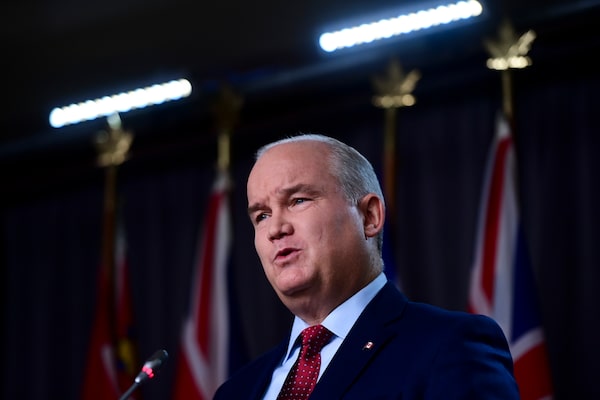
Conservative leader Erin O'Toole holds a press conference on Parliament Hill in Ottawa on Nov. 17, 2020.Sean Kilpatrick/The Canadian Press
Rick Smith is the executive director of the Broadbent Institute and the co-author of two best-selling books on the human health impacts of pollution.
It may seem counterintuitive, but of all the parties in Parliament, the federal Liberal government’s introduction of historic climate-change accountability legislation presents the greatest political opportunity for Erin O’Toole’s Conservatives.
Since becoming leader four months ago, Mr. O’Toole and his team have made much of their desire to reposition the Conservative message in order to attract new voters. After many years of frequently perplexing Conservative climate-change approaches, there is no better way to accomplish this expansion of the Tory tent than for Mr. O’Toole to support this new climate-change law.
He would be in good company if he did so. All over the world, Conservative parties are now leading the climate change debate and, more specifically, creating impressive road maps to achieve measurable climate progress by 2030 and carbon neutrality by 2050.
In the United Kingdom, former climate-change skeptic Prime Minister Boris Johnson has embraced his Conservative predecessor Theresa May’s commitment to making England a country with net-zero emissions, and has adopted more ambitious interim targets and a faster transition to electric vehicles. Mr. Johnson envisions a U.K. that is the “Saudi Arabia of wind power,” and says he wants to see every British home powered by offshore wind. It’s easy to see why Mr. Johnson now views climate change as a major economic opportunity: the U.K. cut its greenhouse gas emissions by 29 per cent between 2010 and 2019, a period during which the country’s economy grew by 18 per cent.
In Germany, Chancellor Angela Merkel has strengthened the country’s climate commitments and has been a stalwart supporter of former German conservative politician and now European Commission President Ursula von der Leyen’s European Green New Deal, which lays out a plan for Europe to become the first carbon-neutral continent. As Ms. von der Leyen explained: “The European Green Deal is not just a necessity: it will be a driver of new economic opportunities.” Traditional European climate change leaders like Germany are now being outpaced by other conservative-governed jurisdictions such as Poland. According to Polish climate minister Michal Kurtyka, his country – though producing the highest per-capita emissions in Europe – is now moving “extremely fast” toward carbon neutrality.
Beyond Europe, conservative governments have started kicking their climate change action into high gear in places such as Japan, where the new Prime Minister has committed to going carbon neutral by 2050 and moving aggressively away from the burning of coal. In Australia, Prime Minister Scott Morrison has been urged by his fellow conservative Mr. Johnson to take “bold action” on climate. As Mr. Johnson told Mr. Morrison, “the U.K.’s experience demonstrates that driving economic growth and reducing emissions can go hand-in-hand.”
Were he to reposition his party’s climate change message, Mr. O’Toole has a rich history of Canadian Conservative environmental leadership to draw on. Former prime minister Brian Mulroney was famously voted the “greenest Prime Minister in Canadian history” for his work on acid rain and biodiversity conservation. Former Ontario premier Bill Davis established brave new policies such as protections for the Niagara Escarpment that still measurably benefit the quality of life for Ontarians. Closer to the present day, conservative premiers such as Gordon Campbell and François Legault have implemented ground-breaking new climate policy.
As opposed to the United States, Canada has enjoyed a relatively high degree of co-operation between political parties when it comes to dealing with the ravages of the COVID-19 pandemic. For the ever-practical Angela Merkel, the climate question is simply a matter that, like COVID-19, involves following the science. Ms. Merkel, a trained physicist, reportedly told her fellow EU members that “Something that impresses me as a scientist is when Greta Thunberg says ‘unite behind the science.’ We’re not doing something ideological here, but something for which there is massive evidence and which we need to counteract.”
Like their ideological counterparts the world over, this should be the sort of “evidence” that Canada’s Conservatives can get behind.
Rick Smith decided to conduct an experiment on himself to see if he could measure an increase of microplastics in his body. The author and Executive Director of the Broadbent Institute says the lab-based tests on his stool samples are the first of their kind in North America to search for traces of the tiny plastic particles in people. Microplastics have been discovered circulating in the environment and are linked to health concerns.
The Globe and Mail
Keep your Opinions sharp and informed. Get the Opinion newsletter. Sign up today.